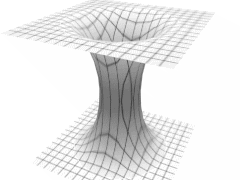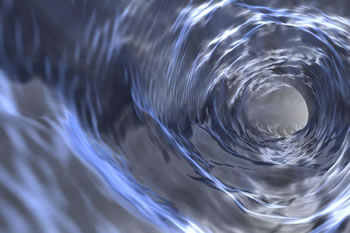Science Fiction
Dictionary
A B C D E F G H I J K L M N O P Q R S T U V W X Y Z
Traversable Wormholes And Time Machines May Not Be Usable

According to a new paper by researchers Roman Buniy and Stephen Hsu, traversable wormholes and time machines cannot be both stable and predictable. Albert Einstein and Nathan Rosen published the first scientific paper on wormholes (also called Einstein-Rosen bridges) in 1935, describing how it might be possible for two distant regions of space-time to be connected through a tunnel-like spatial shortcut.
The basic idea of a wormhole derives from a simple analogy. If the universe is like the skin of an apple (from a topological viewpoint), a worm trying to crawl to diametrically opposite points could save time by boring through the apple, rather than staying on the surface. Another version of this kind of analogy uses the idea that you can bring two distant points on a sheet of paper together - by folding the paper.

(Wormhole diagram)
The resulting "wormhole" consists of two or more "mouths" (or holes in the surface) connected to a "throat" which provides the passage.
A traversable wormhole could be used for either travel from one point to another, or from one time to another. Unfortunately, according to the paper, quantum effects are necessary for the construction of stable traversable wormholes. This would cause the wormhole to behave unpredictably; you might not know where (or when) you would come out. Wormholes and time machines cannot be both predictable and stable.
"We aren't saying you can't build a wormhole. But the ones you would like to build - the predictable ones where you can say Mr Spock will land in New York at 2pm on this day - those look like they will fall apart," Dr Hsu said.
(From Wormholes no use for space travel)
This is very bad news for science fiction fans. Wormholes have been used by generations of sf writers to enable ships to travel between stars in the time it takes to turn a page. In his 1934 story Xandulu, Jack Williamson writes "I can fold space as readily as you double a sheet of paper. I can reach through hyperspace where distance means nothing."
In his 1939 novel Gray Lensman, E.E. "Doc" Smith refers to "Dirac Holes" and "hyperspatial tubes" that can be used instead of being forced to traverse normal space. By the time Isaac Asimov's Foundation series debuted in 1950, hyperspace travel was commonplace.
What would it be like to step through a wormhole? Frank Herbert described a jumpdoor's "vortal tube" in this way:
The jumpdoor began to hum with its aura of terrifying energies. The door's vortal tube snapped open. McKie tensed himself for the syrupy resistance to jumpdoor passage, stepped through the tube. It was like swimming in air became molasses - perfectly normal-appearing air. But molasses.
(Read more about the vortal tube.)

(If you could see a wormhole)
Read more at Semi-classical wormholes and time machines are unstable (pdf) and the news story Wormholes no use for space travel.
Scroll down for more stories in the same category. (Story submitted 5/24/2005)
Follow this kind of news @Technovelgy.| Email | RSS | Blog It | Stumble | del.icio.us | Digg | Reddit |
Would
you like to contribute a story tip?
It's easy:
Get the URL of the story, and the related sf author, and add
it here.
Comment/Join discussion ( 15 )
Related News Stories - (" Space Tech ")
The New Habitable Zones Include Asimov's Ribbon Worlds
'...there's a narrow belt where the climate is moderate.' - Harl Vincent, 1931.
Will Space Stations Have Large Interior Spaces Again?
'They filed clumsily into the battleroom, like children in a swimming pool for the first time, clinging to the handholds along the side.' - Orson Scott Card, 1985.
Reflect Orbital Offers 'Sunlight on Demand' And Light Pollution
'I don't have to tell you about the seven two-mile-diameter orbital mirrors...'
Chrysalis Generation Ship to Alpha Centauri
'This was their world, their planet ó
this swift-traveling, yet seemingly moveless vessel.' - Nat Schachner, 1934
Technovelgy (that's tech-novel-gee!) is devoted to the creative science inventions and ideas of sf authors. Look for the Invention Category that interests you, the Glossary, the Invention Timeline, or see what's New.
Science Fiction
Timeline
1600-1899
1900-1939
1940's 1950's
1960's 1970's
1980's 1990's
2000's 2010's
Current News
The New Habitable Zones Include Asimov's Ribbon Worlds
'...there's a narrow belt where the climate is moderate.'
Can One Robot Do Many Tasks?
'... with the Master-operator all you have to do is push one! A remarkable achievement!'
Atlas Robot Makes Uncomfortable Movements
'Not like me. A T-1000, advanced prototype. A mimetic poly-alloy. Liquid metal.'
Boring Company Drills Asimov's Single Vehicle Tunnels
'It was riddled with holes that were the mouths of tunnels.'
Humanoid Robots Tickle The Ivories
'The massive feet working the pedals, arms and hands flashing and glinting...'
A Remarkable Coincidence
'There is a philosophical problem of some difficulty here...'
Cortex 1 - Today A Warehouse, Tomorrow A Calculator Planet
'There were cubic miles of it, and it glistened like a silvery Christmas tree...'
Perching Ambush Drones
'On the chest of drawers something was perched.'
Leader-Follower Autonomous Vehicle Technology
'Jason had been guiding the caravan of cars as usual...'
Golf Ball Test Robot Wears Them Out
"The robot solemnly hit a ball against the wall, picked it up and teed it, hit it again, over and again...'
Boring Company Vegas Loop Like Asimov Said
'There was a wall ahead... It was riddled with holes that were the mouths of tunnels.'
Rigid Metallic Clothing From Science Fiction To You
'...support the interior human structure against Jupiterís pull.'
Is The Seattle Ultrasonics C-200 A Heinlein Vibroblade?
'It ain't a vibroblade. It's steel. Messy.'
Roborock Saros Z70 Is A Robot Vacuum With An Arm
'Anything larger than a BB shot it picked up and placed in a tray...'
A Beautiful Visualization Of Compact Food
'The German chemists have discovered how to supply the needed elements in compact, undiluted form...'
Bone-Building Drug Evenity Approved
'Compounds devised by the biochemists for the rapid building of bone...'
